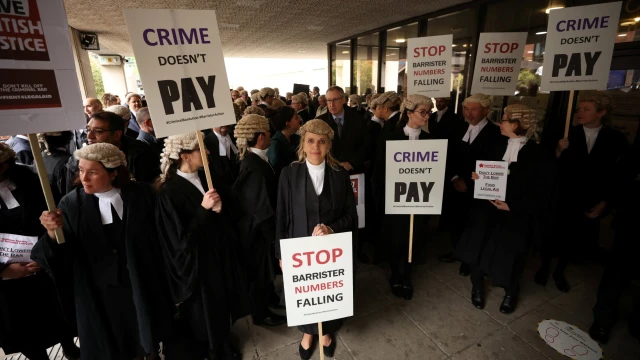By David Young-
Barristers have voted to go on an indefinite, uninterrupted strike in England and Wales from next month.
All plans to broker a deal behind the scenes by bringing forward payments have been to no avail.
The walkout by members of the Criminal Bar Association (CBA) to begin on 5 September is a poor reflection on the Ministry Of Justice, which ought to have effectively addressed issues of pay surrounding this seemingly never ending dispute.
The strikes will delay thousands of cases, leaving victims and the accused in limbo for justice, whilst barristers continue to fight for their dues.
Members have been striking on alternate weeks in a dispute with the government over pay, working conditions and legal aid funding.
The CBA is asking for a 25% rise in pay for legal aid work, representing defendants who could not otherwise afford lawyers. Members have rejected the government’s 15% pay offer, saying it would not kick in immediately or apply to existing cases.
Ministers have described the result as an “irresponsible decision”, but it is they who appear irresponsible by allowing the dispute to liner on this long without championing a resolution. The Uk government also faces escalating industrial action in the rail industry and threats of strikes from teachers and health workers.
The Labour leader, Keir Starmer, accused the government of doing “absolutely nothing” to resolve industrial disputes, including the row with criminal barristers.
The ballot of barristers closed at midnight on Sunday and the result was announced on Monday morning. The association said 79.5% of barristers who voted (1,808) supported the move to a full-time strike over legal aid rates, which they said had in effect been cut by 28% over the past decade.
The vast majority of crown court trials in England and Wales will be adjourned at a consequence, while others could collapse entirely.
The CBA vice-chair, Kirsty Brimelow QC, said this was “last-resort action” over a demand for less money than it costs the government for the courts to sit empty.
She told BBC Breakfast: “The effect of the strike will be that the courts continue to sit empty with trials and cases not being heard. It is a last-resort action.
“The remedy is for an injection of money into the backlog of cases, which currently stands at 60,000 cases, that barristers are working on that will cost the government only £1.1m per month. Currently, it’s costing much more for the courts to sit empty.”
Out of 2,273 votes cast, an overwhelming 1,808 members (79.5%) voted to escalate the strike, while 258 were in favour of continuing the current action, and 207 in favour of stopping all action..
Quite simply, this strike has been years in the coming. Criminal barristers are incredibly angry – and it’s very hard to see how this stand-off can be resolved any time soon.
“The escalation of strike action is wholly unjustified considering we are increasing criminal barristers’ fees by 15%, which will see the typical barrister earn around £7,000 more a year,” she said.
Downing Street said it was a “disappointing decision” that would “force victims to wait longer for justice”. A No 10 spokeswoman urged the CBA to “rethink” their plans, saying the government had set out a pay rise for September.
Justice Minister Sarah Dines said the decision by barristers was “irresponsible”.
Opposition leader Sir Keir Starmer – a former barrister – said the government was doing “absolutely nothing” to resolve industrial disputes, including the row with criminal barristers.
“I quite understand, whether it’s barristers or others, why people and how people are struggling to make ends meet,” he said.
A solution to the dispute would be an “injection of money” into the cases barristers were working on, she added.
“The remedy is for an injection of money into the backlog of cases, which currently stands at 60,000 cases, that barristers are working on, that will cost the government only £1.1m per month,” Ms Brimelow said.
“Currently, it’s costing much more for the courts to sit empty.”

